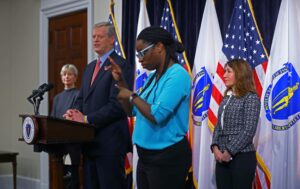To the Editor:
Re “Teachers Can’t Stop the Shootings,” by Sarah Lerner (Opinion guest essay, Dec. 8):
As a recently retired high school principal of 27 years, I understand Ms. Lerner’s concerns. I have had to deal with situations in which students’ drawings and/or writings prompted a follow-up. That always included meeting with the student and parents immediately and requiring that the student undergo a psychiatric evaluation.
During the meeting the parents would be asked if there were guns in the house and if the student had access to any weapons. The student’s backpack and locker would be checked, and the student could not return to school until the evaluation was completed and indicated that the student did not pose a threat.
No system is perfect, but it needs to be made clear to students and parents that all threats are taken seriously. Teachers know their students, and what they see and hear is critical and can save lives.
Lorraine Brooks
Nanuet, N.Y.
To the Editor:
I read Sarah Lerner’s essay with great interest and sadness. I would love to see a complete ban on military-style weapons. However, with many of our representatives’ campaigns being funded with N.R.A. money, we are unlikely to see that. Nor can we easily prevent parents from giving guns to their offspring as “gifts.”
Yes, in retrospect, the Michigan shooting could have been prevented if the warning signs that the shooter was so blatantly demonstrating were heeded. The words “could have, should have, would have” should never have to be used.
One common-sense measure that can be employed is metal detectors. Every time I report for jury duty at a courthouse or board a flight at an airport, I must pass through a metal detector. Are our schools less sacred or important?
If we wait for Congress to act, our schools will be guilty of negligence every time there is a shooting.
George Weinhouse
New York
To the Editor:
As a school psychologist for 30 years in public and private schools, I got to know many hundreds of teachers and the personal characteristics of warmth, flexibility and commitment to children’s growth that made them excellent at what they did. Unfortunately, as in any such group, there were a few individuals whose authoritarian tendencies, lack of common sense and low tolerance for stress often limited student learning and exacerbated student behavior problems.
Like Sarah Lerner, I am philosophically opposed to arming the caretakers of our children, but on a more practical level I’m afraid that many teachers who would choose to carry a weapon would be from the latter group, individuals whose aggressiveness and lack of good judgment could make them act poorly in an emergency and possibly cause collateral damage.
With the seemingly unstoppable proliferation of firearms and their accessibility by children, measures such as locks, metal detectors and armed guards at schools would seem to be a better answer, albeit a sad and expensive one.
Scott Crary
Exton, Pa.
Forbidden Books: ‘Has “Fahrenheit 451” Come to Texas?’
To the Editor:
Re “A Law, an Email and a Furor Over Curriculums” (front page, Dec. 11):
You suggest that the motives of State Representative Matt Krause, a Texas Republican, were “unclear” when he asked school superintendents if 850 books are on their school library shelves.
Wouldn’t it be wonderful if Mr. Krause followed up his question with something like this:
“Well, if they’re not on the shelves, they should be. Don’t you want your students to meet some of the finest minds in America? Don’t you want students to imagine and wonder what it’s like to live in different places throughout the world? To learn that people of all backgrounds have foibles but that they can overcome them to dream and realize impossible dreams? To become more than they ever thought they could be? To learn more words to use to think?”
He could conclude his statement by letting educators know that he is preparing a list of works of art.
Allen Berger
Savannah, Ga.
The writer is emeritus professor of reading and writing, Miami University (Ohio).
To the Editor:
Congratulations to the parents and politicians in Texas who have created a book-banning law. Obviously these folks don’t know teenagers. They have just given the students of Texas a list of the books to order from Amazon.
Welcome to the “brave new world” and McCarthyism 2021. I weep.
Barbara Rosen
Fullerton, Calif.
To the Editor:
Has “Fahrenheit 451” come to Texas?
Martin Schlager
San Jose, Calif.
Help Afghanistan in Its Hour of Need
To the Editor:
“Hunger Catastrophe Looms in Afghanistan” (front page, Dec. 5) reports on the serious likelihood that one million Afghan children may die of starvation this winter. The overall situation in the country continues to be dire, as U.S. financial sanctions continue to be a major cause of this looming catastrophe.
One can certainly support the goal of pressing the Taliban to improve their record on human rights, especially for women. But it seems to me that the most fundamental human right would be to remain alive. Other rights are probably not so much of a concern if you are dying of hunger.
And while this may well be an idealistic fantasy on my part, I wonder if the miserable history of this war-torn nation might somehow begin to turn a corner if the Afghans were to receive massive international aid in their hour of crisis, instead of repeated invasions by military occupiers. And perhaps it might help the reputation of the United States, after the debacle of our military withdrawal.
One would also hope that some of the enormously wealthy people in our nation (who have gotten even richer during the pandemic) might step up at a time like this — instead of, or in addition to, taking voyages into space or purchasing enormous yachts.
James Culnan
La Crescenta, Calif.
Abortion After the Trauma of Incest
To the Editor:
Re “My Father Raped Me. An Abortion Saved Me,” by Michele Goodwin (Opinion guest essay, Dec. 3):
I am deeply grateful for Ms. Goodwin’s courage and candor in recounting the tragedy of the incestuous abuse she suffered, which resulted in a childhood pregnancy and necessitated (yes, necessitated) the trauma of an abortion. I empathize with her, yet I’m thankful this surgical solution was available to her.
Obviously, there are many who argue that abortion is never a necessary choice, even in the case of rape or incest. However, I am a licensed adoption professional who has witnessed the anguish of pregnant incest victims.
I have struggled to find homes for their children, and to answer those adoptees’ questions later on. And as such, I can attest that adoption is not always an optimal choice for those traumatized young mothers or their offspring. (Nor is there a vast surplus of prospective adopters seeking babies with the lasting special needs that often result from such conceptions.)
If Ms. Goodwin has healed, how dare anyone challenge the means of her recovery?
Elizabeth Jurenovich
San Antonio
The writer is the executive director of Abrazo Adoption Associates.
What Kind of America Do We Want?
To the Editor:
The most important thing in the next election is not the issues; it’s all about the kind of America we want to live in. Do we want to live in an America that condones lying, is comfortable with racists, puts down people who are different, puts people in cages and separates children from their parents?
I am a veteran of World War II, and that is not the kind of America that my generation put their lives on the line to save. The choice is just that simple.
Leonard Kliff
Laguna Woods, Calif.



















